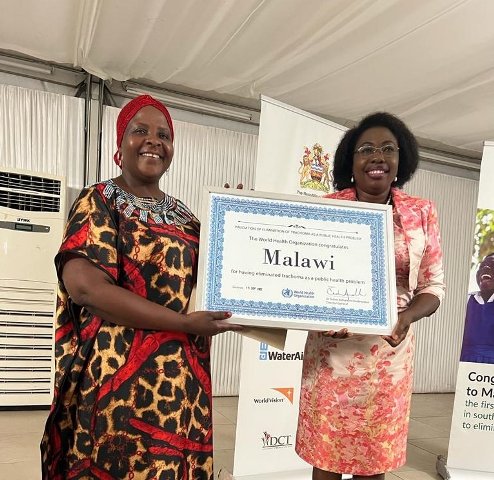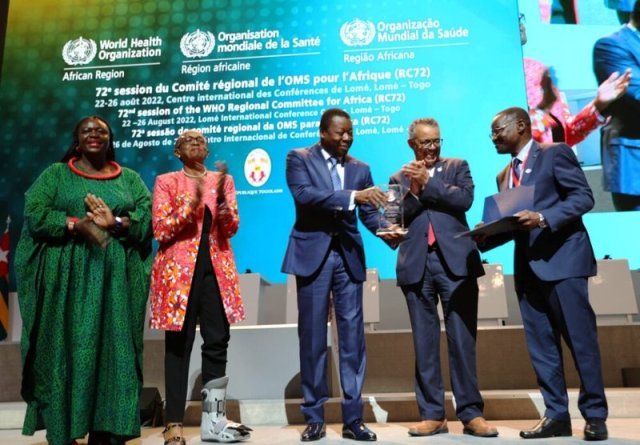By Thoko Elphick-Pooley
As an African, I am proud to join the continent in celebrating Africa Day. There is so much to celebrate. Just yesterday, I attended the launch of the 2023 Africa Economic Outlook at the African Development Bank Annual Meetings in Sharm El Sheik. The report shows the resilience of the African continent despite multiple shocks including the COVID-19 pandemic, disruptions to supply chain caused by the war in Russia and Ukraine and severe weather events. For example, the continent recorded a GDP growth of approximately 3.8% in 2022 which is above the global average of 3.4%.
I am particularly proud of the progress being made in an area of work that is close to my heart, the fight against neglected tropical diseases (NTDs).

NTDs are a group of preventable and treatable diseases that affect close to 1.7 billion people around the world. They include diseases such as leprosy, bilharzia, intestinal worms, sleeping sickness, and Guinea worm disease. Over one third of people affected by NTDs live in Africa. These diseases have a profound effect on people’s lives; they cause immeasurable suffering, prevent adults from being able to work, and children from being able to go to school. They rob the continent of its vital human capital. NTDs also have significant economic impact on households through costs of treatment and care, as well as lost productivity. They create barriers to education, employment, and economic growth as well as stigmatisation which leads to exclusion from society.
But today I want to share five examples of phenomenal progress that has been made to curb these devasting diseases on the African continent.
- 21 countries in Africa have eliminated at least one NTD, with several countries having eliminated two, three and four NTDs. Sustained domestic and international commitment to control, eliminate, and eradicate these diseases has accelerated progress against individual country targets.
- Togo was the first ever country globally to eliminate four NTDs: Guinea worm disease, elephantiasis (lymphatic filariasis), sleeping sickness and trachoma. Benin has eliminated three NTDs: Guinea worm disease, sleeping sickness and trachoma.
- Malawi was the first southern African country to eliminate an NTD, starting with elephantiasis (lymphatic filariasis) in 2020, a parasitic disease transmitted by mosquitoes that leads to disfiguring swelling and disability. More recently (2022) Malawi eliminated trachoma, a contagious bacterial infection and the world’s leading cause of infectious blindness which just seven years ago was such a major public health challenge in the country with over seven million people at risk.
- Ghana was the first country in sub-Saharan African country to eliminate trachoma, and just last week the World Health Organization announced that Mali and Benin had eliminated trachoma, bringing to seven the number of countries in Africa that have eliminated this painful and disabling disease.
- Collectively, Africa is demonstrating leadership, committing to ending NTDs by 2030. The continent’s Heads of State, under the auspices of the African Union, signed the Kigali Declaration on NTDs, a high-level, political declaration to mobilise political will, community commitment, resources and action, and secure commitments needed to end suffering. Heads of State also endorsed the Continental Framework whose vision is to free Africa of all NTDs by 2030 and provides guidance on key approaches that should be implemented; as well as the Common African Position that recommends how to address NTDs in Africa.
The countries’ achievement and continental leadership are both a cause for celebration, as the African Union marks its 60th anniversary. It is a major milestone, considering fighting disease was on the top agenda of African countries at the dawn of independence.
However, despite this progress, a lot more remains to be done before we see an Africa free from NTDs.
The task remains huge. NTDs are still endemic in 49 African countries. Effects of the pandemic and other economic shocks threaten to derail momentum by delaying, disrupting, and redirecting resources for programmes against these diseases. Equally, climate change will increase the spread of NTDs as they are directly influenced by changes in temperature, rainfall, relative humidity, and climate.
Despite these obstacles, we must continue to make advances and not lose our momentum. What has been accomplished by countries in recent years, with support from partners, is truly a global success story. We must protect and build on these gains. Securing increased funding and developing sustainable, long-term funding solutions will be critical. This is the year for accelerating progress, and we must come together with renewed vigour and a clear vision for the future. I have confidence that we can do it!
Let’s work together to achieve the vision of Member States in the Continental Framework: an Africa free of NTDs by 2030.

